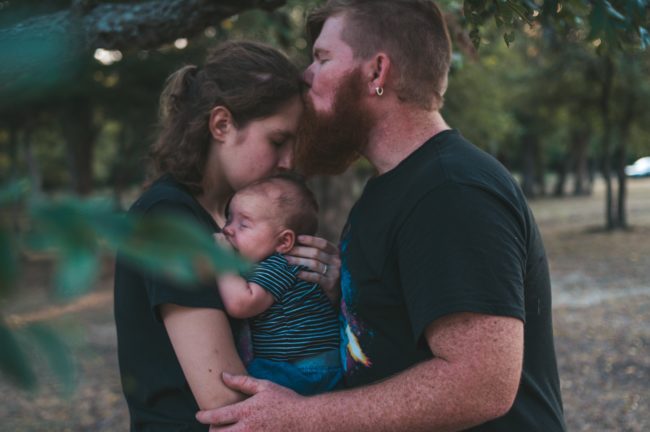When you discover your partner is pregnant, you may anticipate that you have nine months before your part begins. Not so! We count down through the major pregnancy milestones that you need to know about…

Week 4: moment of discovery
You might have lots of different feelings and thoughts in the first hours, days and weeks finding out that you have a baby on the way. Planned or surprise, a pregnancy is a major life changing event which means experiencing mixed feelings can be completely normal. It isn’t unusual to think your partner hates you. Negative thoughts don’t make you a bad person or mean that you are not ready to be a father, everyone goes through this at some point, find out more – Am I ready to be a dad?
You or your partner may worry about the possibility of miscarriage. A miscarriage is when a pregnancy naturally ends before its 24th week. It is thought that around one in five confirmed pregnancies ends this way and the highest risk of it happening is within the first 12 weeks. If you experience a miscarriage it can be important to make sure that you both get support. Miscarriage and fathers.
Your partner may start noticing physical changes associated with pregnancy within the first 6 weeks, and need your support. It can be hard to appreciate that she may be feeling physical side effects as she won’t look obviously pregnant, but the first weeks can be the hardest with the strongest symptoms. The first three months of pregnancy
Week 8: first antenatal appointment – the ‘booking’ appointment
This is the longest routine antenatal appointment you are likely to attend. It usually lasts about an hour, and occurs when your partner is 8 to 12 weeks pregnant.
You will be asked where you want to birth your baby, so that the right paperwork can be completed, so have a think beforehand about your preferences. You can always change your mind later if you wish though. Birth plans.
It’s useful for you to attend this appointment because there are questions about both of you and your medical histories, including ethnic origin (some conditions are more prevalent in some ethnic groups) and any medical conditions that run in the family. The answers to the questions help the antenatal team find out about any particular risks to your partner and your baby. Your partner will need to take or produce a urine specimen, her height, weight and blood pressure will be measured and blood tests will be offered – so it is useful to discuss in advance which tests you wish to have and if there are any you wish to decline. Tests and checks
The appointment is also a great opportunity to ask any questions you may have, the midwife is there to support you both. What can a dad expect from a good maternity service?

Week 12: first scan – the ‘dating’ scan
The first ultrasound scan is to confirm the presence of a foetus, and to date the pregnancy – this scan will be where you get your ‘estimated due date’ or ‘EDD’ which is used throughout the rest of the pregnancy. The scan is carried out at around 12 weeks.
All being well, you’ll see your baby and their little heart pumping away. This may be the first time it really hits home that you will be (or in fact ARE!) a dad. Not one to be missed (and make sure you get a scan picture!) Scans: What to expect
You will also often be offered the choice of the nuchal fold screening test at this scan. Tests and Checks.
The dating scan is held towards the end of the first three months of pregnancy and is a milestone that your baby and partner are about to move into The second three months of pregnancy
Week 20: second scan – the ‘anomaly’ scan
You will be offered a second ultrasound scan between weeks 20 and 22. This is the anomaly scan and lasts longer than the first dating scan as the sonographer will be looking at the baby and uterus in more detail. Scans: What to expect
At around the same time as this scan, you are also likely to have the Triple Test done if you have chosen to have it. Tests and checks
At this scan you may also have the opportunity to find out the sex of the baby – this is not the aim of the scan though, and will depend on whether baby is in a position where this can be determined and if your local hospital offers this. It is also worth bearing in mind that finding out the sex is a question of interpretation, so occasionally human error means it can be wrong!

Week 21: first kicks
Your baby is rapidly growing and starting to get busy – moving, kicking, stretching, punching – and you will soon be able to feel his first kicks. This is a great opportunity to start building that bond with your baby! A Dads guide to bonding with his unborn baby.
Week 24: voice recognition
Your baby will react to sound and learn to distinguish voices by pitch and cadence, including your own. So chat to your baby, read them a story or sing them a song! This is all part of your baby getting to know and bond with you. A Dads guide to bonding with his unborn baby.
Week 25: book paternity leave
Employed new fathers in the UK are now entitled to at least two weeks’ paternity leave for and following the birth of their baby.To take paternity leave you must give your employer written notice around week 25 or 26 of pregnancy. Paternity leave eligibility and pay can vary (although there are statutory minimums), so check your contract or talk to your HR department to check your individual entitlement.
If you don’t qualify for paternity leave you still have options.
Find out more Dads Rights

Week 28 onwards – regular midwife appointments
Regular midwife appointments enable checks that your partner is well and that the baby is growing normally. They also provide a regular opportunity to ask any questions which either of you have.
The midwife can test mums urine, listen to the baby’s heartbeat and check their growth by measuring mums’ growing belly. Tests and checks
They will also ask about how baby is moving. If you or your partner ever feel that baby is not following their usual pattern of movements or especially if there are less movements than usual, you should contact your maternity unit or midwife immediately. Never wait for the next midwife appointment – call someone right away for advice.
You are welcome at these appointments, to support your partner and ask any questions you have. The final three months of pregnancy
Week 30: join an antenatal class
Antenatal classes are definitely not just for women – they provide you both with an opportunity to learn about how to care for your baby, and what happens during birth – important to know if you plan to be there! There are lots of different kinds of antenatal class available – so do some research and find out which ones best suit you both.
What goes on at antenatal classes?

Week 32: make a birth plan
It is really important to think about your choices for birth and the first hours following it – these are some of the first parenting decisions which you will both make!
If part of your plan is that you will be the birth partner, it is also important to be clear on how mum wants support from you and her healthcare providers. You can only support her with her preferences during birth if you know what they are, so it is important to be involved and understand the reasons behind them.
Birth plan: what’s that all about?
Week 36: make the final checks
Your baby’s estimated due date is pinpointed as the first day of week 40 of the pregnancy – but your baby can be born anytime within weeks 37-42 and this is still medically classes as completely normal. Less than 5% of babies arrive on their due date, so it is good to be prepared, but also to be patient! The final countdown
Make sure you are easily contactable at all times, know where the birth bags are kept and keep the car fuelled up… What do I do when she goes into labour?







